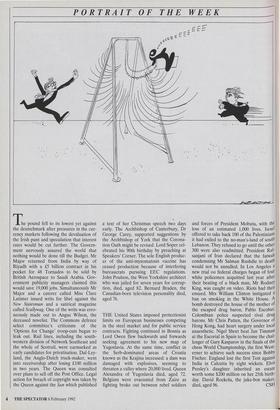PORTRAIT OF THE WEEK
The pound fell to its lowest yet against the deutschmark after pressures in the cur- rency markets following the devaluation of the Irish punt and speculation that interest rates would be cut further. The Govern- ment nervously assured the world that nothing would be done till the Budget. Mr Major returned from India by way of Riyadh with a £5 billion contract in his pocket for 48 Tornados to be sold by British Aerospace to Saudi Arabia. Gov- ernment publicity managers claimed this would save 19,000 jobs. Simultaneously Mr Major and a caterer called Miss Clare Latimer issued writs for libel against the New Statesman and a satirical magazine called Scallywag. One of the writs was erro- neously made out to Angus Wilson, the deceased novelist. The Commons defence select committee's criticisms of the `Options for Change' troop-cuts began to leak out. Rail lines, including the south- western division of Network Southeast and the whole of Scotrail, were earmarked as early candidates for privatisation. Daf-Ley- land, the Anglo-Dutch truck-maker, went into receivership after losing £100 million in two years. The Queen was consulted over plans to sell off the Post Office. Legal action for breach of copyright was taken by the Queen against the Sun which published
a text of her Christmas speech two days early. The Archbishop of Canterbury, Dr George Carey, supported suggestions by the Archbishop of York that the Corona- tion Oath might be revised. Lord Soper cel- ebrated his 90th birthday by preaching at Speakers' Corner. The sole English produc- er of the anti-myxomatosis vaccine has ceased production because of interfering bureaucrats pursuing EEC regulations. John Poulson, the West Yorkshire architect who was jailed for seven years for corrup- tion, died, aged 82. Bernard Braden, the Canadian-born television personality died, aged 76.
THE United States imposed protectionist limits on European businesses competing in the steel market and for public service contracts. Fighting continued in Bosnia as Lord Owen flew backwards and forwards seeking agreement to his new map of Yugoslavia. At the same time, conflict in the Serb-dominated areas of Croatia known as the Krajina increased: a dam was damaged with explosives, seeming to threaten a valley where 20,000 lived. Queen Alexandra of Yugoslavia died, aged 72. Belgians were evacuated from Zaire as fighting broke out between rebel soldiers and forces of President Mobutu, with the loss of an estimated 1,000 lives. Israel offered to take back 100 of the Palestinians it had exiled to the no-man's-land of south Lebanon. They refused to go until the other 300 were also readmitted. President Raf- sanjani of Iran declared that the fatwab condemning Mr Salman Rushdie to death would not be annulled. In Los Angeles a new trial on federal charges began of four white policemen acquitted last year after their beating of a black man, Mr Rodney King, was caught on video. Riots had then ensued. Mrs William Clinton instigated a ban on smoking in the White House. A bomb destroyed the house of the mother of the escaped drug baron, Pablo Escobar; Colombian police suspected rival drug barons. Mr Chris Patten, the Governor of Hong Kong, had heart surgery under local anaesthetic. Nigel Short beat Jan Timman at the Escorial in Spain to become the chal- lenger of Gary Kasparov in the finals of the chess World Championship, the first West- erner to achieve such success since Bobby Fischer. England lost the first Test against India in Calcutta by eight wickets. Elvis Presley's daughter inherited an estate worth some $200 million on her 25th birth- day. David Rockola, the juke-box maker,






















































 Previous page
Previous page